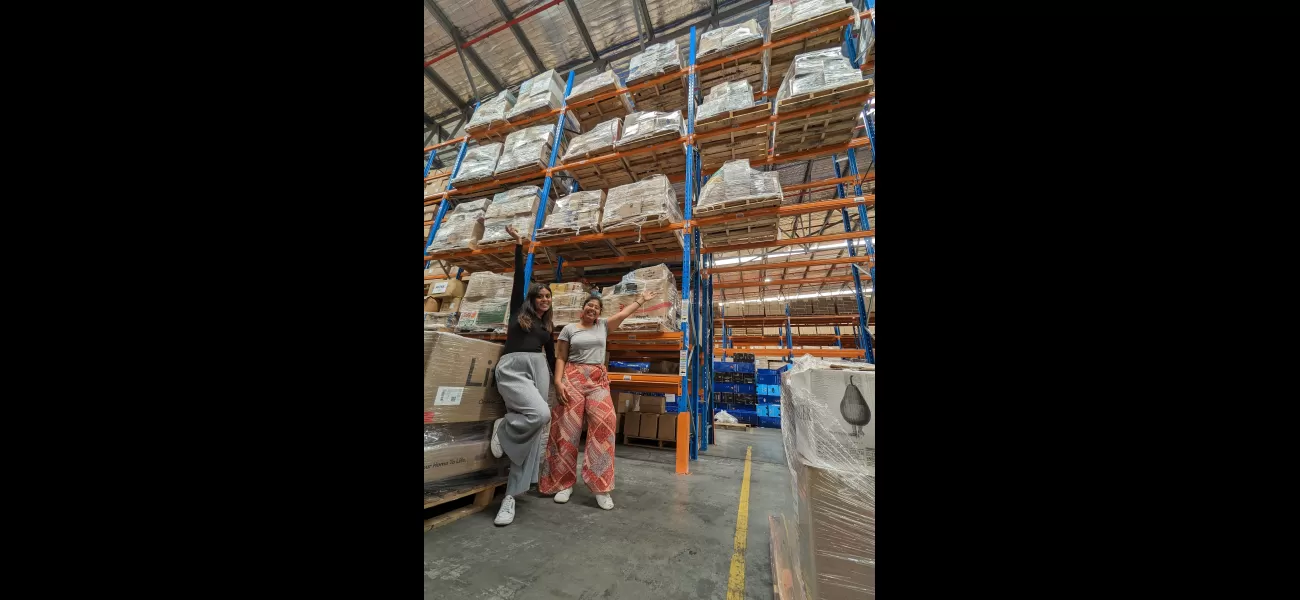Melbourne women saving tons of clothing from going to waste.
Melbourne women join forces to save 11 tonnes of clothing and fabrics from ending up in the trash.
August 11th 2024.

For the past 32 years, Susan Tait has been a skilled furniture maker in Thomastown, located in the north of Melbourne. Alongside her husband, she has always been mindful of creating sustainable products while supporting local manufacturing. However, one aspect of their business that they struggled with was finding a solution for the excess fabric waste they produced. Every year, they would send a whopping 500 kilograms of fabric to landfill, which Tait humorously equated to the size of a one-year-old elephant.
But in January 2023, things changed for the better. Tait stumbled upon an online solution - Australia's first textile recycling pick-up and reward service. This brought a huge sense of relief and peace of mind for Tait and her husband. The service, founded by Yesha Patel and Nehal Jain in 2022, offers a convenient way to recycle textiles, including zips, buttons, and tags, by simply sending them to the company.
Patel and Jain were motivated to start this service after experiencing frustration with the lack of options available to recycle old and unwearable clothes. As Patel explains, "As someone who used to buy a lot of fast fashion, I had a lot of clothes in my wardrobe that were quite unwearable." She found it wrong to donate them to op shops and couldn't find any suitable options as a consumer.
In fact, Australians are known to have the highest clothing consumption per person compared to any other country in the world. On average, an Australian buys 56 new clothing items per year, resulting in a staggering 300,000 tonnes of clothing being thrown away. Out of this, 200,000 tonnes end up in landfills, while the remaining 100,000 tonnes are shipped overseas to countries that lack the infrastructure and expertise to properly recycle textiles.
Patel and Jain are passionate about keeping textiles at their highest possible value and aim to recycle them into new yarn instead of turning them into insulation. However, they face a challenge in Australia, as there is currently no large-scale recycling infrastructure that can transform textiles into new yarn. Since launching their service in the middle of a COVID-19 lockdown with a five-kilometre limit, after has now expanded its collection service across metro Melbourne, Sydney, and Auckland and has successfully diverted over 11 tonnes of textile waste from landfills.
Elly Ackland, a mother of two, was one of their first customers. She found the startup through a local Facebook group and was drawn to the idea of properly dealing with items she could no longer use or donate. "I wear things until they fall to bits. I hate overconsumption," she says. Ackland is willing to pay a small amount to ensure that her clothes are being recycled properly, as she believes in investing in a circular fashion economy.
After charges $20 to collect five kilograms of textile waste from your doorstep, and the team schedules monthly collections. The more you recycle, the cheaper it gets. However, Patel explains that cost is a challenge for them, as recycling is not free. A bigger challenge is the lack of expertise in Australia to recycle textiles into yarn, which forces them to rely on people in countries like India who have better infrastructure and access to the global market for recycled products.
However, Patel and Jain are determined to learn from their international counterparts and work towards creating a more sustainable fashion industry in Australia. They urge people to only give them items that cannot be worn or repaired, such as old towels or bedding, or clothes that are torn or worn out. They believe that every household has these items, and by recycling them, they can make a significant impact.
The team at after has been advocating for the Australian government to do more in tackling the textile waste problem and investing in local recycling options. Unlike France, which has introduced a $16 tax on fast fashion, Australia has opted for a voluntary four-cent tax that retailers are not obligated to pay. The profits from this tax will go to Seamless, a not-for-profit organization that aims to create a circular fashion economy by 2030.
Tait believes that customers are already driving the change towards sustainable fashion. She has noticed an increasing demand for fabrics made from recycled yarn and is pleased to see people willing to pay a little more for these products. "It's not only something we are passionate about, but it's exciting to see it become good business," she says.
But in January 2023, things changed for the better. Tait stumbled upon an online solution - Australia's first textile recycling pick-up and reward service. This brought a huge sense of relief and peace of mind for Tait and her husband. The service, founded by Yesha Patel and Nehal Jain in 2022, offers a convenient way to recycle textiles, including zips, buttons, and tags, by simply sending them to the company.
Patel and Jain were motivated to start this service after experiencing frustration with the lack of options available to recycle old and unwearable clothes. As Patel explains, "As someone who used to buy a lot of fast fashion, I had a lot of clothes in my wardrobe that were quite unwearable." She found it wrong to donate them to op shops and couldn't find any suitable options as a consumer.
In fact, Australians are known to have the highest clothing consumption per person compared to any other country in the world. On average, an Australian buys 56 new clothing items per year, resulting in a staggering 300,000 tonnes of clothing being thrown away. Out of this, 200,000 tonnes end up in landfills, while the remaining 100,000 tonnes are shipped overseas to countries that lack the infrastructure and expertise to properly recycle textiles.
Patel and Jain are passionate about keeping textiles at their highest possible value and aim to recycle them into new yarn instead of turning them into insulation. However, they face a challenge in Australia, as there is currently no large-scale recycling infrastructure that can transform textiles into new yarn. Since launching their service in the middle of a COVID-19 lockdown with a five-kilometre limit, after has now expanded its collection service across metro Melbourne, Sydney, and Auckland and has successfully diverted over 11 tonnes of textile waste from landfills.
Elly Ackland, a mother of two, was one of their first customers. She found the startup through a local Facebook group and was drawn to the idea of properly dealing with items she could no longer use or donate. "I wear things until they fall to bits. I hate overconsumption," she says. Ackland is willing to pay a small amount to ensure that her clothes are being recycled properly, as she believes in investing in a circular fashion economy.
After charges $20 to collect five kilograms of textile waste from your doorstep, and the team schedules monthly collections. The more you recycle, the cheaper it gets. However, Patel explains that cost is a challenge for them, as recycling is not free. A bigger challenge is the lack of expertise in Australia to recycle textiles into yarn, which forces them to rely on people in countries like India who have better infrastructure and access to the global market for recycled products.
However, Patel and Jain are determined to learn from their international counterparts and work towards creating a more sustainable fashion industry in Australia. They urge people to only give them items that cannot be worn or repaired, such as old towels or bedding, or clothes that are torn or worn out. They believe that every household has these items, and by recycling them, they can make a significant impact.
The team at after has been advocating for the Australian government to do more in tackling the textile waste problem and investing in local recycling options. Unlike France, which has introduced a $16 tax on fast fashion, Australia has opted for a voluntary four-cent tax that retailers are not obligated to pay. The profits from this tax will go to Seamless, a not-for-profit organization that aims to create a circular fashion economy by 2030.
Tait believes that customers are already driving the change towards sustainable fashion. She has noticed an increasing demand for fabrics made from recycled yarn and is pleased to see people willing to pay a little more for these products. "It's not only something we are passionate about, but it's exciting to see it become good business," she says.
[This article has been trending online recently and has been generated with AI. Your feed is customized.]
[Generative AI is experimental.]
0
0
Submit Comment





